|
|
|
Sort Order |
|
|
|
Items / Page
|
|
|
|
|
|
|
| Srl | Item |
| 1 |
ID:
130329
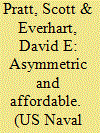

|
|
|
| 2 |
ID:
175164
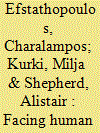

|
|
|
|
|
| Summary/Abstract |
Communities on the planet are faced with complex challenges: changing relations within and between human communities, changing relations with ecological and climatic conditions, and shifts in technology-human interconnections. The complex interconnections across issue areas – migration, environmental degradation and new technologies, for example – demand that scholars increasingly think across theories, paradigms, specialisms and disciplines. But how should we ‘hold things together’ as we try to make sense of complex realities in International Relations (IR)? This introductory article to the Special Issue ‘Facing human interconnections: thinking International Relations into the future’ discusses the open thematic of ‘human interconnections’ that is used to loosely structure the contributions. Analysis of human interconnections, as understood here, does not have a precise or fixed definition but is considered an open-ended notion with varied meanings and dimensions. Indeed, the authors engage it here in varied ways to explore their empirical, theoretical and political concerns. Yet, this notion also allows for interesting new questions to be posed on the potential and limits of IR as it faces the future, and debates around how we see interconnections between issue areas and ‘-isms’, how IR constructs ‘humans’ or ‘non-humans’ in interconnections, and what is at stake in bringing to our attention unacknowledged interconnections. Here we set out why human interconnection is an interesting notion to work with and why we need to keep its meaning open-ended. We also provide an account of six different orientations we observe amongst the authors tackling the dynamics of human interconnections in this Special Issue.
|
|
|
|
|
|
|
|
|
|
|
|
|
|
|
|
| 3 |
ID:
148836
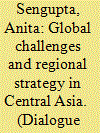

|
|
|
|
|
| Summary/Abstract |
The global war on terror dramatically reinforced the significance of security in the Eurasian region, which had been seemingly on the wane since 1989, but the notion of security that came with it was different from that which had come before.1 In the post 9/11 world, security became a much more expansive, fluid and an uncertain concept. While the State employed traditional military means to achieve security, the State no longer seemed to be the container of security. Terrorism, as the primary security threat, seemed to render the stark division between external and internal threat meaningless. This uncertainty of security has multiplied the sites at which ‘security’ may be found. Traditional sites, such as militaries and conflict, have been rearticulated but they have been joined by border fences, detention centres, airport security counters, places of worship and even universities. However, even as insecurity processes become increasingly transnational and even global in their dynamics and scope, many States continue to be profound sources of insecurity both to other States and people.
|
|
|
|
|
|
|
|
|
|
|
|
|
|
|
|
| 4 |
ID:
148714
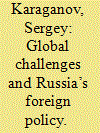

|
|
|
|
|
| Summary/Abstract |
The article discusses the results of Russian foreign policy since the collapse of the Soviet Union against the background of major new global and regional international trends and the policy of other major world powers. The author argues that Russia should work for preventing a new structured confrontation in Europe, maintaining international stability, and keeping the world from sliding into a big war which seems to be more likely now than ever before in the last 50 years. At the same time it should join forces with China, India, Iran and other major non-Western players in building a community of cooperation, development and security for Greater Eurasia, open to the world and serving as one of the pillars of its stable and peaceful development. The world is changing incredibly fast and precariously. Russia must occupy a leading place in this world by moving towards economic growth and playing a key role in preventing a new world war, supporting global strategic stability and building or rebuilding international cooperation and security structures for the decade to come.
|
|
|
|
|
|
|
|
|
|
|
|
|
|
|
|
| 5 |
ID:
138538
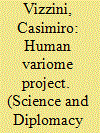

|
|
|
|
|
| Summary/Abstract |
One way to address the global challenges of public health in developing countries is through international collaboration to share data. It’s important to do this not just for humanitarian reasons but because open information is at the heart of scientific progress. One field in which this is particularly evident is genomic research, which has made revolutionary progress in recent years. Since the first genetic variation causing inherited disease (sickle-cell anemia) was defined at the protein level sixty years ago,1 it has become possible to locate, isolate, sequence, and clone individual genes. Indeed, there has been an explosion in research to discover the function of each of the twenty thousand or so human genes.
|
|
|
|
|
|
|
|
|
|
|
|
|
|
|
|
| 6 |
ID:
179202
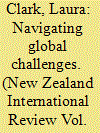

|
|
|
|
|
| Summary/Abstract |
The elements in which New Zealand and the United Kingdom find themselves include the prevailing winds, the storms coming at them across the horizon and the threats to their security and way of life. Safely navigating these seas demands the careful determination of priorities over the next ten years, and of how they mean to act on the world stage. Important questions arise as to what that means in terms of tools and capability; relationships; and ability to work together. The United Kingdom is committed to working together with New Zealand, both bilaterally and multilaterally, to tackle global challenges and promote global goods.
|
|
|
|
|
|
|
|
|
|
|
|
|
|
|
|
| 7 |
ID:
116612
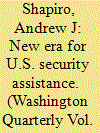

|
|
|
|
|
| Publication |
2012.
|
| Summary/Abstract |
As the United States transitions from a decade of war, it is clear that the task of maintaining global stability and addressing global challenges must be a shared responsibility. Working with allies and partners to address common security challenges has been a critical part of U.S. policy for decades. But the increased interconnectedness associated with global economic advances, while bringing prosperity to more countries and regions, has also meant that the security of the United States can be affected by events in more places, more countries, and more regions. This has led to an increased demand to expand our partnerships and deepen our security relationships. As Secretary Clinton noted recently, "building coalitions for common action is becoming both more complicated and more crucial."1
|
|
|
|
|
|
|
|
|
|
|
|
|
|
|
|
| 8 |
ID:
104546
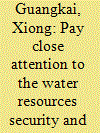

|
|
|
| 9 |
ID:
094604
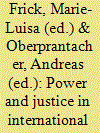

|
|
|
|
|
| Publication |
Surrey, Ashgate Publishing Company, 2009.
|
| Description |
xxii, 272p.
|
| Standard Number |
9780754677710
|
|
|
|
|
|
|
|
|
|
|
|
Copies: C:1/I:0,R:0,Q:0
Circulation
| Accession# | Call# | Current Location | Status | Policy | Location |
| 054864 | 341/FRI 054864 | Main | On Shelf | General | |
|
|
|
|
| 10 |
ID:
103246
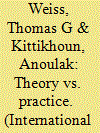

|
|
|
|
|
| Publication |
2011.
|
| Summary/Abstract |
This special presidential issue addresses the theory-practice question across major institutions and global challenges. First, what is the influence of scholars on institutions? What accounts for influence or the lack thereof? What type of future engagement should exist for scholars on these institutions? Second, what are acceptable theoretical approaches to a given global challenge? What are the existing policies and practices, and do they coincide with dominant scholarly approaches? What relationship would be most useful between theory and practice on any issue? The 51st International Studies Association Annual Convention and these pages explore the impacts of scholars on policymaking and institutions as well as the limitations of theory in responding to global challenges. Stereotypes obfuscate the complex reality that scholarship matters.
|
|
|
|
|
|
|
|
|
|
|
|
|
|
|
|
| 11 |
ID:
139325
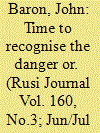

|
|
|
|
|
| Summary/Abstract |
As policy-makers around the globe come to terms with an altogether more complicated international landscape, marked by the rise and increasing assertiveness of new powers and the growing importance of non-state actors, it is ever-more important that foreign policy is underpinned by robust strategic thinking. In this article, John Baron explores the costs of cuts to the Foreign Office and defence budgets, deploring the adverse effects not only on the UK's hard and soft power, but also on its strategy-making.
|
|
|
|
|
|
|
|
|
|
|
|
|
|
|
|
| 12 |
ID:
129211
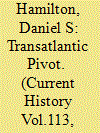

|
|
|
|
|
| Publication |
2014.
|
| Summary/Abstract |
A quarter century after the fall of the Berlin Wall, relations between the United States and Europe have evolved from a single-minded focus on stabilizing the European continent into more diffuse security, economic, and diplomatic agendas encompassing three broad elements. The first is ensuring the continued
vitality of the transatlantic alliance while taming the turbulent spaces of wider Europe. The second is guaranteeing mutual economic recovery while harnessing deep integration to create jobs and fuel growth, and also repositioning Europe and the United States for a world of emerging economies. The third is addressing a range of regional and global challenges, from energy security and nonproliferation to Middle Eastern turmoil and uncertain Asian dynamics.
|
|
|
|
|
|
|
|
|
|
|
|
|
|
|
|
| 13 |
ID:
121959
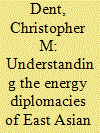

|
|
|
|
|
| Publication |
2013.
|
| Summary/Abstract |
Energy security is one of the major global challenges of the twenty-first century. Intensifying competition for ever scarcer forms of conventional energy resources is causing significant tensions in the international system. East Asia will have a more profound impact on global energy security than any other region as its burgeoning demand for energy fuels, spurred principally by China, is expected to continue growing at over twice the world average in the next few decades. This paper examines the reasons why we may expect the energy diplomacies of East Asian states to become an increasingly salient feature of East Asian states' foreign policy and international relations in the foreseeable future, and thereby significantly shape the nature of the region's international political economy. It presents a framework of energy diplomacy analysis in order to better understand how East Asian states are formulating their energy diplomacy strategies and actions. The four prime elements of this framework comprise: empirical perspectives and generic task-oriented terms; agential influences on the formation and organization of energy diplomacy practice; the energy-development nexus; and transaction mechanisms of energy diplomacy. The main conclusions are first, mercantilist approaches to energy diplomacy will persist but continue to gradually give way to market institutionalism; second, energy diplomacy will become increasingly linked to other forms of diplomacy, such as trade, environment and development assistance; third, we may expect East Asian states to afford greater priority to multilateral energy co-operation both regionally and in a wider international or global sense as energy security interdependencies deepen; and fourth, East Asia's growing reliance on sourcing energy fuels from outside the region will make it more dependent on stable international energy markets-these markets are becoming increasingly internationalized and globalized, which will broaden the future options of East Asian states developing new international energy partnerships.
|
|
|
|
|
|
|
|
|
|
|
|
|
|
|
|
|
|
|
|
|